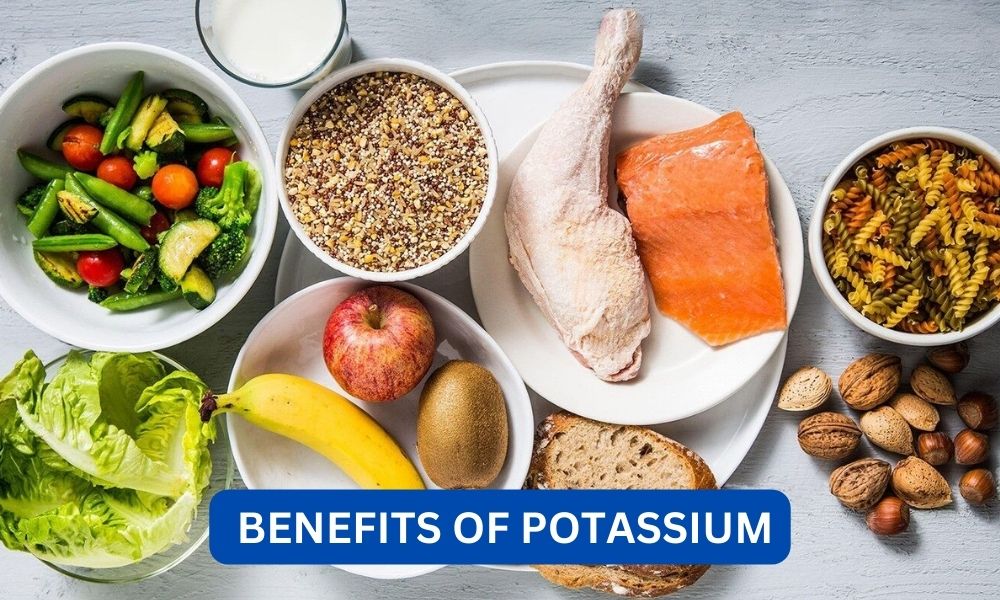Potassium is an essential mineral that plays a crucial role in maintaining our overall health and well-being. It is one of the seven essential macrominerals that our bodies need in relatively large amounts to function properly. Potassium is found in many foods, including fruits, vegetables, dairy products, and meats. It is also available as a dietary supplement. In this article, we will explore the benefits of potassium and why it is essential for our bodies.
Contents
The Benefits of Potassium
Potassium has numerous benefits for our bodies, and it is essential for maintaining our overall health. Let’s take a closer look at some of the key benefits of potassium.
1. Regulates Blood Pressure
Potassium plays a crucial role in regulating blood pressure. It works in conjunction with sodium to maintain the balance of fluids in our bodies. When we consume too much sodium, our bodies retain water, which can increase blood pressure. Potassium helps to counteract the effects of sodium by promoting the excretion of excess sodium through urine, thus lowering blood pressure.
According to a study published in the American Journal of Physiology, increasing potassium intake can significantly lower blood pressure in individuals with hypertension (high blood pressure). The study found that for every 1,000 mg increase in potassium intake, there was a 3.49 mmHg decrease in systolic blood pressure and a 1.96 mmHg decrease in diastolic blood pressure.
Read:What are the benefits of pre workout?2. Reduces the Risk of Stroke
High blood pressure is a significant risk factor for stroke. As mentioned earlier, potassium helps to regulate blood pressure, which can, in turn, reduce the risk of stroke. A study published in the American Journal of Clinical Nutrition found that individuals who consumed the most potassium had a 21% lower risk of stroke compared to those who consumed the least amount of potassium.
3. Supports Heart Health
Potassium is essential for maintaining a healthy heart. It helps to regulate heart rhythm and ensures that our hearts beat at a steady pace. Potassium also helps to lower blood pressure, which can reduce the risk of heart disease and stroke. A study published in the Journal of the American College of Cardiology found that individuals who consumed the most potassium had a 49% lower risk of death from ischemic heart disease compared to those who consumed the least amount of potassium.
4. Promotes Bone Health
Potassium is essential for maintaining strong and healthy bones. It works in conjunction with calcium to build and maintain bone density. A study published in the Journal of Bone and Mineral Research found that individuals who consumed the most potassium had a 6% higher bone mineral density compared to those who consumed the least amount of potassium.
Read:What are the benefits of walking backwards?5. Improves Muscle Function
Potassium plays a crucial role in muscle function. It helps to regulate muscle contractions and ensures that our muscles function properly. Potassium also helps to prevent muscle cramps and spasms. A study published in the Journal of Physiology found that potassium supplementation can improve muscle function and reduce fatigue in athletes.
6. Regulates Fluid Balance
Potassium is an electrolyte that helps to regulate fluid balance in our bodies. It works in conjunction with sodium to maintain the balance of fluids inside and outside our cells. Potassium helps to prevent dehydration and ensures that our bodies have enough fluids to function properly.
7. Supports Kidney Function
Potassium is essential for maintaining healthy kidney function. It helps to regulate the amount of fluid in our bodies, which can reduce the workload on our kidneys. Potassium also helps to prevent the formation of kidney stones. A study published in the Journal of the American Society of Nephrology found that individuals who consumed the most potassium had a 35% lower risk of developing kidney stones compared to those who consumed the least amount of potassium.
Sources of Potassium
As mentioned earlier, our bodies cannot produce potassium, so we must obtain it from our diet. Potassium is found in many foods, including fruits, vegetables, dairy products, and meats. Some of the best sources of potassium include:
Read:What are the benefits of elderberry- Bananas
- Avocados
- Spinach
- Sweet potatoes
- Salmon
- White beans
- Yogurt
- Tomatoes
- Oranges
- Beef
It is essential to note that the amount of potassium in foods can vary depending on how they are prepared. For example, boiling vegetables can cause them to lose some of their potassium content. It is best to consume a variety of potassium-rich foods to ensure that you are getting enough of this essential mineral.
Potassium Deficiency
Potassium deficiency, also known as hypokalemia, is a condition where the body does not have enough potassium. It can be caused by various factors, including inadequate intake of potassium, excessive sweating, and certain medical conditions. Some of the symptoms of potassium deficiency include muscle weakness, fatigue, constipation, and irregular heartbeat.
If left untreated, potassium deficiency can lead to more severe health problems, such as high blood pressure, kidney stones, and heart disease. It is essential to consume enough potassium in your diet to prevent deficiency and maintain optimal health.
Conclusion:
Potassium is an essential mineral that plays a crucial role in maintaining our overall health and well-being. It is essential for regulating blood pressure, reducing the risk of stroke, supporting heart health, promoting bone health, improving muscle function, regulating fluid balance, and supporting kidney function. It is found in many foods, including fruits, vegetables, dairy products, and meats. It is crucial to consume enough potassium in your diet to reap its numerous benefits and maintain optimal health.
Remember to consult with your healthcare provider before making any significant changes to your diet or taking potassium supplements. They can help you determine the right amount of potassium for your individual needs and ensure that it does not interact with any medications you may be taking. With a balanced and varied diet, you can easily meet your daily potassium needs and enjoy the many benefits it has to offer.









